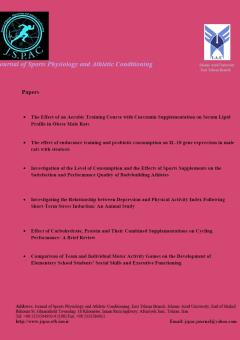Investigation of the Level of Consumption and the Effects of Sports Supplements on the Satisfaction and Performance Quality of Bodybuilding Athletes
محورهای موضوعی : تغذیه ورزشیMohamad Ilanloo 1 , Alireza Eizadi 2 , Behzad Divkan 3
1 - MA, Exercise Physiology, Department of Physical Education & Sport Sciences, East Tehran Branch, Islamic Azad University, Tehran, Iran
2 - Department of Physical Education and Sport Sciences, East Tehran Branch, Islamic Azad University, Tehran, Iran
3 - Department of Physical Education and Sport Sciences, East Tehran Branch, Islamic Azad University, Tehran, Iran.
کلید واژه: Sports supplements, Satisfaction, Performance, Muscle efficiency, Bodybuilding,
چکیده مقاله :
Background: The use of different kinds of dietary supplements is rising dramatically on a global scale these days. These substances include multifunctional performance-enhancing supplements, herbal supplements, and everyday vitamins. The main objective of this research is to find out how bodybuilding athletes' performance quality, muscle efficiency, and degree of satisfaction are affected by sports supplements. Materials and Methods: This study used a survey approach conducted in the field using a standardized questionnaire in conjunction with a descriptive-analytical research design. The study's statistical population included 131 participants who were among the top ten bodybuilding competitors at national championships. For statistical analysis, Friedman and linear regression tests were used after the data was collected. Results: The study results suggest that the majority of respondents concur that the use of sports supplements directly affects the functioning of body muscles. Moreover, the prolonged use of supplements that enhance weight and muscle volume has an increased effect on the performance of these athletes. The benefits of sports supplements are particularly noticeable throughout the second to fourth years of training for bodybuilding athletes as they continue to use these supplements. Conclusion: Evidence suggests that sports supplements have a discernible influence on muscle efficiency and the performance of bodybuilding athletes. Nevertheless, the use of sports supplements does not have a substantial impact on athlete satisfaction.
Background: The use of different kinds of dietary supplements is rising dramatically on a global scale these days. These substances include multifunctional performance-enhancing supplements, herbal supplements, and everyday vitamins. The main objective of this research is to find out how bodybuilding athletes' performance quality, muscle efficiency, and degree of satisfaction are affected by sports supplements. Materials and Methods: This study used a survey approach conducted in the field using a standardized questionnaire in conjunction with a descriptive-analytical research design. The study's statistical population included 131 participants who were among the top ten bodybuilding competitors at national championships. For statistical analysis, Friedman and linear regression tests were used after the data was collected. Results: The study results suggest that the majority of respondents concur that the use of sports supplements directly affects the functioning of body muscles. Moreover, the prolonged use of supplements that enhance weight and muscle volume has an increased effect on the performance of these athletes. The benefits of sports supplements are particularly noticeable throughout the second to fourth years of training for bodybuilding athletes as they continue to use these supplements. Conclusion: Evidence suggests that sports supplements have a discernible influence on muscle efficiency and the performance of bodybuilding athletes. Nevertheless, the use of sports supplements does not have a substantial impact on athlete satisfaction.
1. Candow DG, Little JP, Chilibeck PD, Abeysekara S, Zello GA, Kazachkov M, Cornish SM, Yu PH. Low-dose creatine combined with protein during resistance training in older men. Med Sci Sports Exerc. 2008 Sep;40(9):1645-52. doi: 10.1249/MSS.0b013e318176b310. PMID: 18685526.
2. Chrusch MJ, Chilibeck PD, Chad KE, Davison KS, Burke DG. Creatine supplementation combined with resistance training in older men. Med Sci Sports Exerc. 2001 Dec;33(12):2111-7. doi: 10.1097/00005768-200112000-00021. PMID: 11740307.
3. Cribb PJ, Williams AD, Stathis CG, Carey MF, Hayes A. Effects of whey isolate, creatine, and resistance training on muscle hypertrophy. Med Sci Sports Exerc. 2007 Feb;39(2):298-307. doi: 10.1249/01.mss.0000247002.32589.ef. PMID: 17277594.
4. Dascombe BJ, Karunaratna M, Cartoon J, Fergie B, Goodman C. Nutritional supplementation habits and perceptions of elite athletes within a state-based sporting institute. J Sci Med Sport. 2010 Mar;13(2):274-80. doi: 10.1016/j.jsams.2009.03.005. Epub 2009 Sep 22. PMID: 19775936.
5. Eliot KA, Knehans AW, Bemben DA, Witten MS, Carter J, Bemben MG. The effects of creatine and whey protein supplementation on body composition in men aged 48 to 72 years during resistance training. J Nutr Health Aging. 2008 Mar;12(3):208-12. doi: 10.1007/BF02982622. PMID: 18309444.
6. Moradi, J. Relationship between Sports Participation Motivation and Satisfaction of Sports Selected Fields. Sport Psychology Studies, 2017; 6(19): 43-56. doi: 10.22089/spsyj.2017.2551.1264.
7. Molinero O, Márquez S. Use of nutritional supplements in sports: risks, knowledge, and behavioural-related factors. Nutr Hosp. 2009 Mar-Apr;24(2):128-34. PMID: 19593480.
8. Sánchez Oliver A, Miranda León MT, Guerra-Hernández E. Prevalence of protein supplement use at gyms. Nutr Hosp. 2011 Sep-Oct;26(5):1168-74. doi: 10.1590/S0212-16112011000500037. PMID: 22072369.
9. Payne JR, Kotwinski PJ, Montgomery HE. Cardiac effects of anabolic steroids. Heart. 2004 May;90(5):473-5. doi: 10.1136/hrt.2003.025783. PMID: 15084526; PMCID: PMC1768197.
10. Peterson. N.A. Hughey. J. Tailoring organizational characteristics for empowerment: Accommodating individual economic resources. Journal of Cmmunity practice. 2002. 10(3); PP: 41-59.
11. Philen RM, Ortiz DI, Auerbach SB, Falk H. Survey of advertising for nutritional supplements in health and bodybuilding magazines. JAMA. 1992 Aug 26;268(8):1008-11. PMID: 1501305.
12. Rodek J, Sekulic D, Kondric M. Dietary supplementation and doping-related factors in high-level sailing. J Int Soc Sports Nutr. 2012 Dec 7;9(1):51. doi: 10.1186/1550-2783-9-51. PMID: 23217197; PMCID: PMC3536606.


